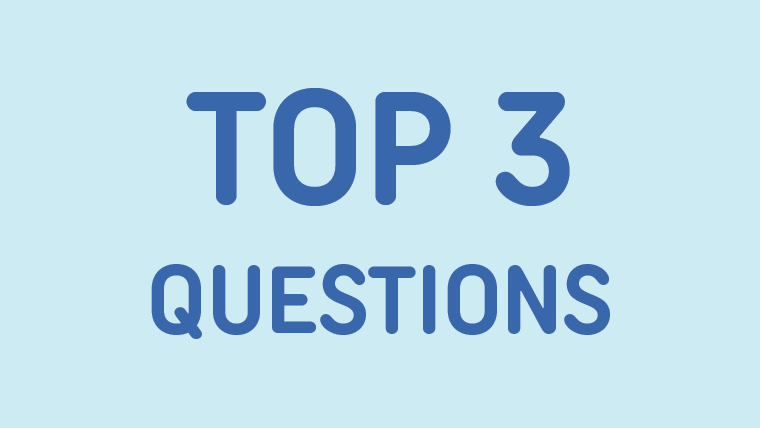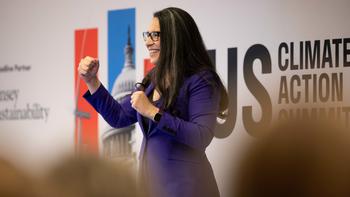
Hello, my name is Professor Michael Kidd, Deputy Chief Medical Officer with the Australian Government Department of Health, and welcome to this week’s Top 3. I’m speaking to you from Ngunnawal country, and in the words of the Ngunnawal people, dhawura nguna dhawura Ngunnawal. Yanggu ngalamanyin dhunimanyin. Ngunawalwari dhawurawari. Dindi wanggiralidjinyin. I acknowledge the traditional owners of the lands where each of us is meeting today, pay my respects to Elders past and present, including any Elders joining us on today’s Top 3.
So, the Easter weekend is upon us, and I want to wish you all a enjoyable holiday weekend with your family members, friends and other loved ones, but also a safe Easter weekend. COVID-19 is still with us. Last week, nearly 400,000 people were diagnosed with COVID-19, so if you are going to large gatherings around the country over this weekend there is the risk that you may come in contact with someone with COVID-19 and you may be infected, even if you are up to date with your vaccination. So, think about what you’re doing, if you feel comfortable wearing a mask, you can wear a mask, just because mandates have been lifted in many parts of the country and you no longer need to wear a mask doesn’t mean that you can’t still wear a mask if you feel comfortable, and that helps, of course, to protect you against contracting COVID-19. Very importantly, if you have symptoms that could be COVID-19, stay at home and arrange to do a rapid antigen test at home, or arrange to get a PCR test. And I just wanted to remind you about the possible symptoms of COVID-19, because it’s not all runny noses and cough. Symptoms can include having a fever, having chills, having a sore throat, having a cough, having shortness of breath or difficulty breathing when you exert yourself, being tired, having nasal congestion or a runny nose, having headache, muscle pains, body aches, nausea, vomiting, diarrhoea, loss of taste, or loss of smell. Now you may have one or more of those symptoms, you may have all of them, but even one of those symptoms can indicate that you’re infected with COVID-19. And even if you’re vaccinated you may still be infectious and at risk of infecting other people. So, please, if you have those symptoms, stay at home and arrange to get tested. But I do wish you all a happy Easter weekend. So, now to your Top 3.
We’ve heard a lot in the media over the last couple of weeks about vaccines, both vaccines for COVID-19, including a special winter booster vaccine, and also about the annual, seasonal influenza vaccine the vaccine that we have each year to protect us from the flu, from influenza, which usually peaks in Australia during our winter season. So, let’s go to your Top 3 questions about the vaccines. First one is, “I am confused by recent publicity about another booster. Is everyone now expected to have four doses of a COVID-19 vaccine?” Well, for most people being up to date with your COVID-19 vaccine is having had the initial two doses of the vaccine and then a booster dose. But the Australian Technical Advisory Group on Immunisation, ATAGI, has recommended that some people should get a additional booster dose, what we’re calling a winter booster dose, and this is for people who are at increased risk of becoming severely unwell if they contract COVID-19. And so, this includes people who are aged 65 and above, Aboriginal and Torres Strait Islander people who are aged 50 and above, people who are living in residential aged care or disability care facilities, and people aged 16 years and above who are immune compromised and who may be at risk of not having had the previous doses of the vaccine being as effective as for many other people. And this includes people who have cancer, people who are receiving chemotherapy or radiotherapy, people who have immune deficiencies, people with conditions like HIV, people who are taking medication which can suppress the immune system. So, anyone in those groups is recommended to have a booster dose, a second COVID-19 vaccine booster. And this is recommended four months after the first booster dose. So, if it’s now coming up to four months since you had your first booster dose, and you’re 65 and over or belong to one of those other at-risk groups, please arrange to get your winter booster dose now, and that will provide you with continuing high levels of protection against becoming severely unwell if you are unfortunate enough to contract COVID-19 during the months ahead.
Your next question is, “I’m up to date with my COVID vaccines, should I get the flu vaccine?” And the answer there is yes. So, even if you’ve had two doses of the COVID vaccine and then a booster, and, for those who are eligible, a winter booster dose as well, you still need to get the influenza vaccine. Vaccination against COVID-19 does not protect you against influenza. So, influenza vaccination is recommended for everybody in Australia aged 6 months and above, so everyone from babies aged 6 months and above to whatever age you may be, you’re recommended to have an annual influenza vaccine. And this year we’re particularly keen that people get their flu vaccine because we are starting to see influenza re-emerge, it’s been largely absent for the last two years but we have seen outbreaks occurring during the winter in the northern hemisphere and we’re starting to see cases of influenza in Australia, and the number of cases is starting to rise. So, please get that additional protection provided by the influenza vaccine. Now, people are at risk of becoming seriously unwell, and some people lose their lives each year to influenza, and that includes the very young, the elderly, and people with immune compromise. But also, some strains of influenza can cause very serious illness in otherwise young, healthy adults, so it’s important that we all get our flu vaccine and get it each year. The flu vaccines are available now, and my advice is to get your vaccine during either April or May, and that will protect you throughout the winter months. The protection from the flu vaccine usually lasts for eight months or more, so if you get your vaccine now you’re protected right through winter and into spring for whenever we get serious outbreaks of influenza in Australia. A reminder, there’s a special infleunza vaccine for those aged 65 and above, your GP will know which vaccine is most suitable for you. And free influenza vaccines are available to a number of groups in Australia, for people aged 65 and above, for children aged between 6 months and 5 years, for women who are pregnant at any stage of pregnancy, for Aboriginal and Torres Strait Islander people aged 6 months and above, and for anyone aged 6 months and above who has a serious medical condition. And those serious medical conditions include heart disease, chronic lung disease, including severe asthma, diabetes, kidney disease, neurological conditions, for example strokes or dementia, people with impaired immunity, and people with blood disorders. So, large group of people who are eligible for free influenza vaccines. Influenza vaccines are available through your General Practitioner, or through your local pharmacy, as has been the case over many, many years. So, please, get your flu vaccine. If you’ve got any questions about vaccines, you can always call the National Coronavirus Helpline, 1800 020 080.
So, your third question this week is about, “When should I get my flu vaccine? And can I have the booster and the flu jab at the same time?” So, your flu vaccine is due right now, and the answer is yes, you can get a COVID-19 booster, whether it’s your first booster dose, or whether it’s that important winter booster dose for those people who are eligible and it’s recommended, you can have the flu vaccine and a COVID-19 vaccine on the same day. My recommendation is that you get each vaccine in a separate arm, so if you do get a sore arm you know which vaccine has caused that particular side-effect, If you have had a particularly rough time after one of your COVID-19 vaccines or after a previous influenza vaccine, you may choose to space to space out getting the vaccines, getting one one week, getting one another week, or you may be brave and decide I’ll just get both of them done on the same day. It’s safe to have both vaccines carried out on the same day if that’s what you’d like to do. So, please keep up to date with your vaccines, please get your annual influenza vaccine as soon as you can, and let’s all stay healthy together.
Thank you everybody, thanks for all the work that you’re doing with spreading the good health messages to everyone in Australia, and thanks for all that you’re doing to help keep everyone as well as possible, especially over the festive weekend. Thanks everyone, look forward to seeing you again next week with the Top 3.
Top 3 questions
- I am confused by recent publicity about another booster! Is everyone now expected to have four doses?
- Should I get the 2022 flu vaccine? When should I get it?
- Can I have the booster and the flu jab together?









